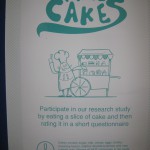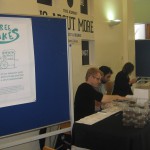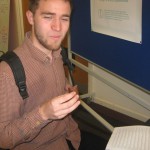October 8, 2015, by Lindsay Brooke
Have your cake and rate it!
As 13 million of us sat down to watch the final of the Great British Bake Off 2015 last night two academics at The University of Nottingham were putting the final touches to a cake survey – all in the name of research of course!
Khaled Bachour and Nils Jaeger in the School of Computer Science are part of a team that wants to establish a new rating for cake based on the attributes of cake rather than just the ingredients.
- Food innovation research
- Free cake on offer for food innovation research
- Art student Connor Hollingsworth samples free cake.
Today Khaled and Nils were offering students free slices of cake in return for a little information about their perceptions around the attributes of cake – attractiveness, bitterness, chewiness, how crumbly it is, how fluffy, fruity and moist it is.
Why?
The EPSRC funded research project is a collaboration with the Royal College of Art and Brunel University in London aimed at developing new ICT tools to promote open innovation in food manufacturing – innovation that is driven and led by consumers rather than the manufacturer.
Dr Khaled Bachour, a research fellow in the School of Computer Science, said: “We are currently in the process of laying the groundwork for this research by establishing and evaluating ways in which consumers can express their experience in food consumption, with the view of using these methods to then express their requirements and desires.”
The study involves providing members of the public with pieces of cake (off-the-shelf supermarket products) and asking them to taste and rate the cake along different criteria.
The aim is two fold
Dr Bachour said: “We would like to build a parametric model of various cakes by averaging the values they were scored across attributes in a specialised cake vocabulary. This will help us evaluate the current vocabulary in terms of it’s accessibility, its reliability, its expressiveness and its ability to distinguish different cakes from each other.
“We want to study the suitability of a new ‘rating scale’, one that differs from regular point-based scales such as the Likert scale in that it allows participants to select a range of value rather than an individual value. This allows participants to express uncertainty in their responses, rather than limit themselves to very specific values. We believe this to be a more suitable method for expressing views based on experience and perception that are rarely clear cut.”
The results are a long way off but they’ve had no trouble getting volunteers! Go on – have your cake and rate it.
No comments yet, fill out a comment to be the first




Leave a Reply